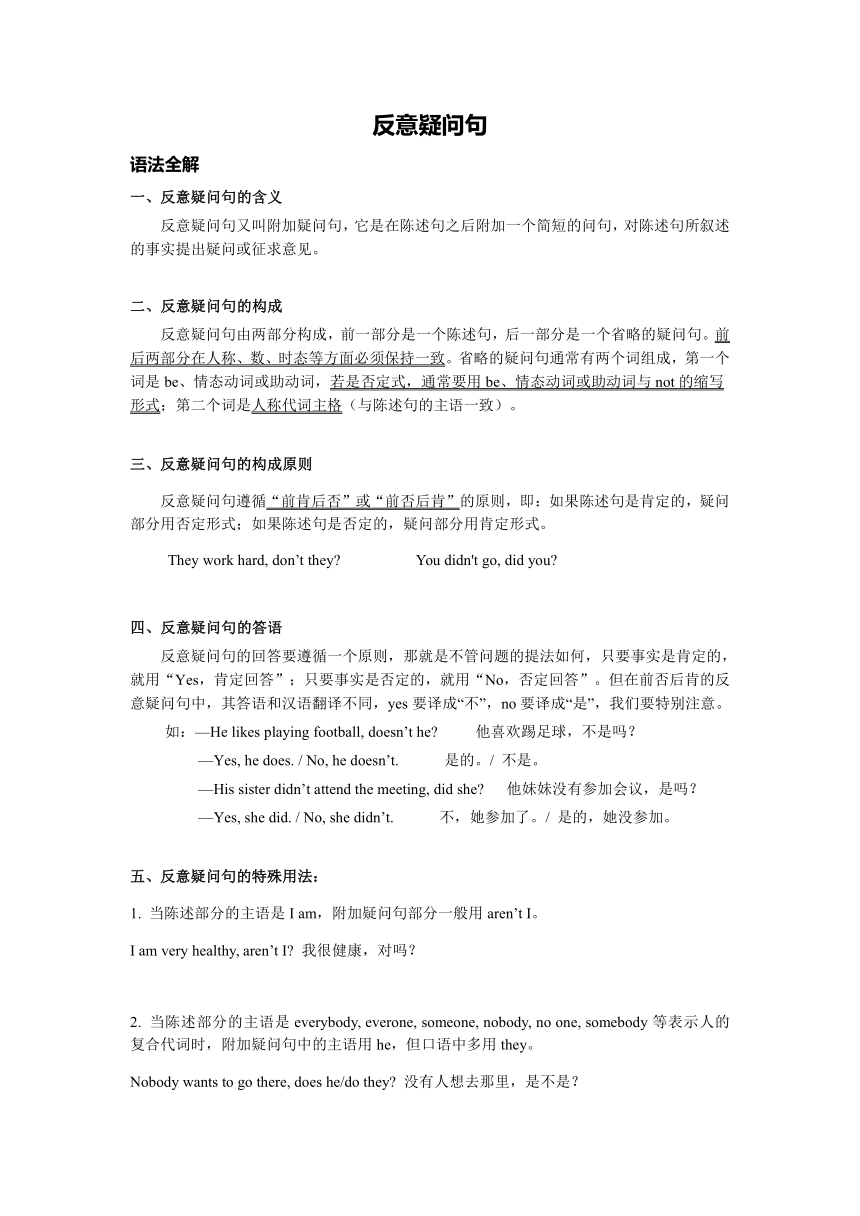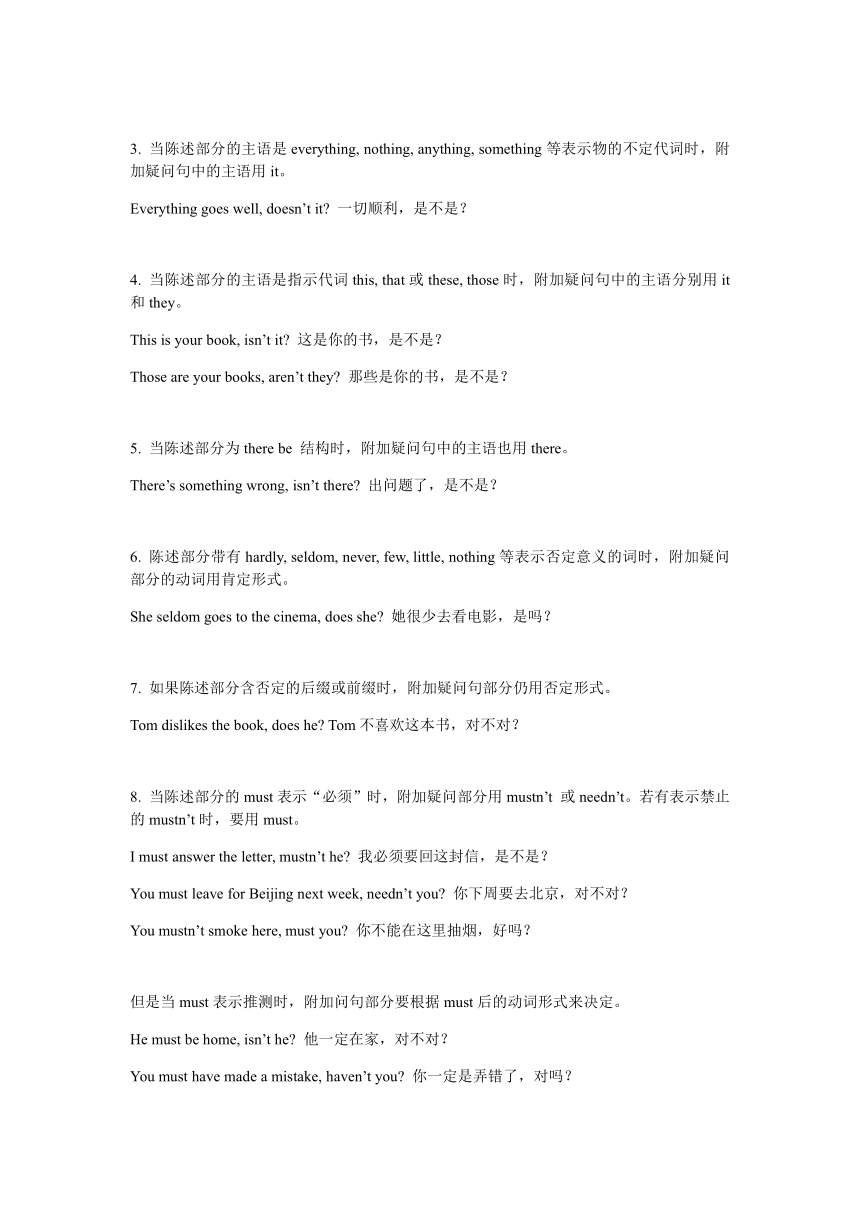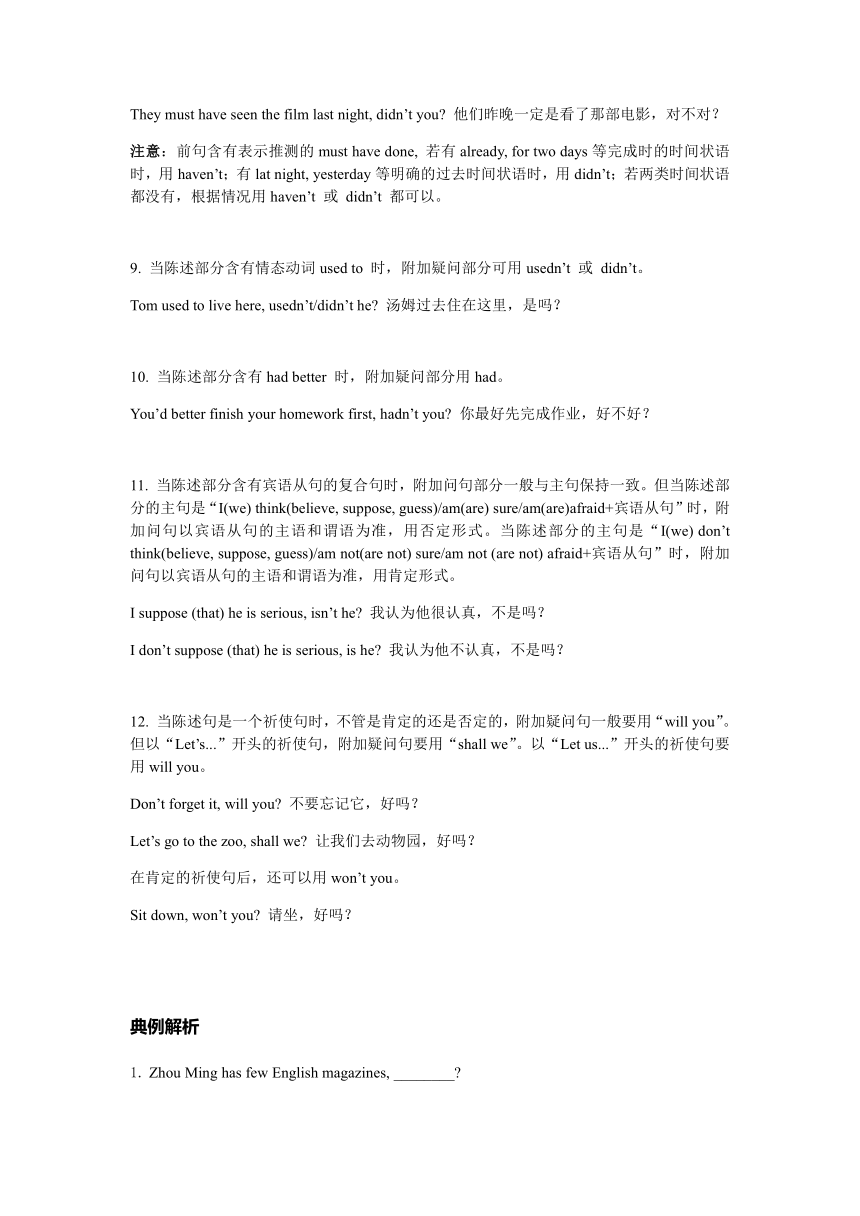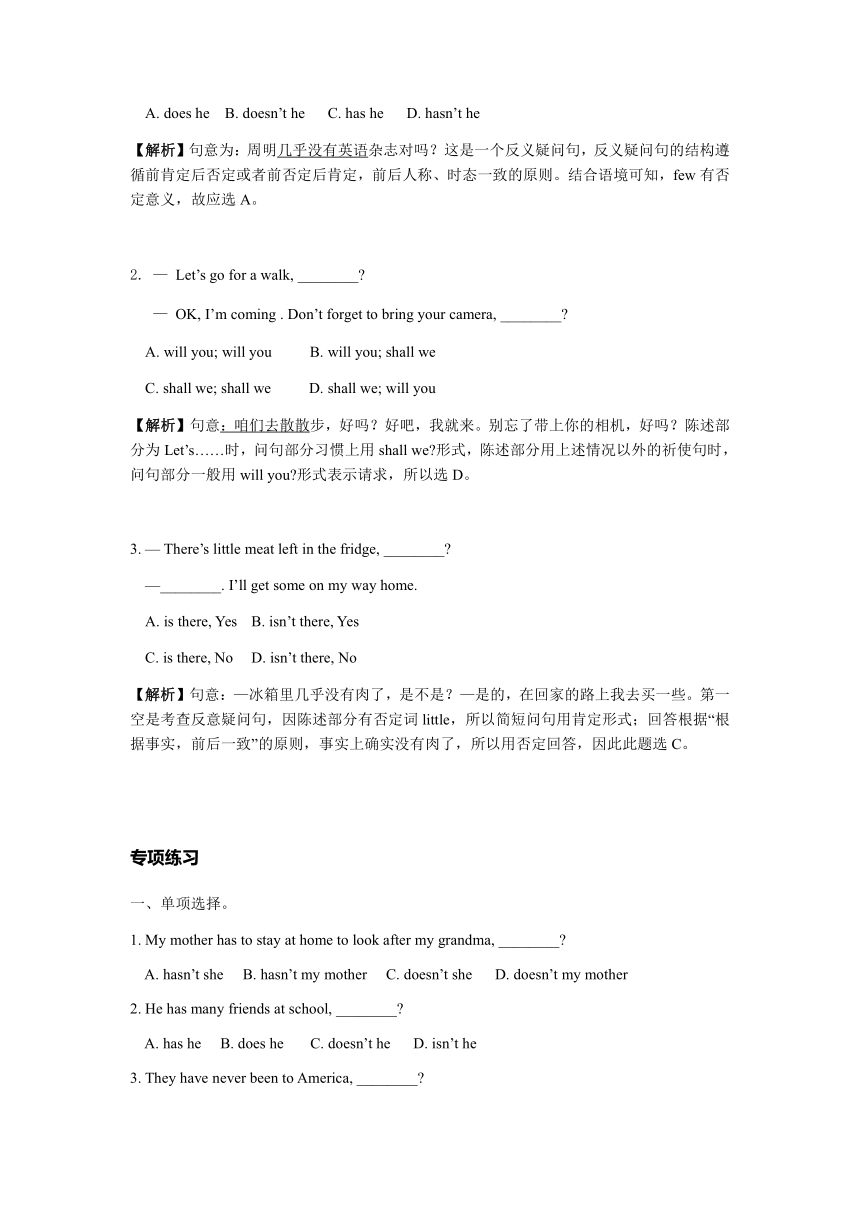2022年英语中考语法专题_反意疑问句(word版,含答案)
文档属性
| 名称 | 2022年英语中考语法专题_反意疑问句(word版,含答案) |  | |
| 格式 | docx | ||
| 文件大小 | 38.0KB | ||
| 资源类型 | 教案 | ||
| 版本资源 | 通用版 | ||
| 科目 | 英语 | ||
| 更新时间 | 2022-05-20 14:55:10 | ||
图片预览




文档简介
反意疑问句
语法全解
一、反意疑问句的含义
反意疑问句又叫附加疑问句,它是在陈述句之后附加一个简短的问句,对陈述句所叙述的事实提出疑问或征求意见。
二、反意疑问句的构成
反意疑问句由两部分构成,前一部分是一个陈述句,后一部分是一个省略的疑问句。前后两部分在人称、数、时态等方面必须保持一致。省略的疑问句通常有两个词组成,第一个词是be、情态动词或助动词,若是否定式,通常要用be、情态动词或助动词与not的缩写形式;第二个词是人称代词主格(与陈述句的主语一致)。
三、反意疑问句的构成原则
反意疑问句遵循“前肯后否”或“前否后肯”的原则,即:如果陈述句是肯定的,疑问部分用否定形式;如果陈述句是否定的,疑问部分用肯定形式。
They work hard, don’t they You didn't go, did you
四、反意疑问句的答语
反意疑问句的回答要遵循一个原则,那就是不管问题的提法如何,只要事实是肯定的,就用“Yes,肯定回答”;只要事实是否定的,就用“No,否定回答”。但在前否后肯的反意疑问句中,其答语和汉语翻译不同,yes要译成“不”,no要译成“是”,我们要特别注意。
如:—He likes playing football, doesn’t he 他喜欢踢足球,不是吗?
—Yes, he does. / No, he doesn’t. 是的。/ 不是。
—His sister didn’t attend the meeting, did she 他妹妹没有参加会议,是吗?
—Yes, she did. / No, she didn’t. 不,她参加了。/ 是的,她没参加。
五、反意疑问句的特殊用法:
1. 当陈述部分的主语是I am,附加疑问句部分一般用aren’t I。
I am very healthy, aren’t I 我很健康,对吗?
2. 当陈述部分的主语是everybody, everone, someone, nobody, no one, somebody等表示人的复合代词时,附加疑问句中的主语用he,但口语中多用they。
Nobody wants to go there, does he/do they 没有人想去那里,是不是?
3. 当陈述部分的主语是everything, nothing, anything, something等表示物的不定代词时,附加疑问句中的主语用it。
Everything goes well, doesn’t it 一切顺利,是不是?
4. 当陈述部分的主语是指示代词this, that或these, those时,附加疑问句中的主语分别用it和they。
This is your book, isn’t it 这是你的书,是不是?
Those are your books, aren’t they 那些是你的书,是不是?
5. 当陈述部分为there be 结构时,附加疑问句中的主语也用there。
There’s something wrong, isn’t there 出问题了,是不是?
6. 陈述部分带有hardly, seldom, never, few, little, nothing等表示否定意义的词时,附加疑问部分的动词用肯定形式。
She seldom goes to the cinema, does she 她很少去看电影,是吗?
7. 如果陈述部分含否定的后缀或前缀时,附加疑问句部分仍用否定形式。
Tom dislikes the book, does he Tom不喜欢这本书,对不对?
8. 当陈述部分的must表示“必须”时,附加疑问部分用mustn’t 或needn’t。若有表示禁止的mustn’t时,要用must。
I must answer the letter, mustn’t he 我必须要回这封信,是不是?
You must leave for Beijing next week, needn’t you 你下周要去北京,对不对?
You mustn’t smoke here, must you 你不能在这里抽烟,好吗?
但是当must表示推测时,附加问句部分要根据must后的动词形式来决定。
He must be home, isn’t he 他一定在家,对不对?
You must have made a mistake, haven’t you 你一定是弄错了,对吗?
They must have seen the film last night, didn’t you 他们昨晚一定是看了那部电影,对不对?
注意:前句含有表示推测的must have done, 若有already, for two days等完成时的时间状语时,用haven’t;有lat night, yesterday等明确的过去时间状语时,用didn’t;若两类时间状语都没有,根据情况用haven’t 或 didn’t 都可以。
9. 当陈述部分含有情态动词used to 时,附加疑问部分可用usedn’t 或 didn’t。
Tom used to live here, usedn’t/didn’t he 汤姆过去住在这里,是吗?
10. 当陈述部分含有had better 时,附加疑问部分用had。
You’d better finish your homework first, hadn’t you 你最好先完成作业,好不好?
11. 当陈述部分含有宾语从句的复合句时,附加问句部分一般与主句保持一致。但当陈述部分的主句是“I(we) think(believe, suppose, guess)/am(are) sure/am(are)afraid+宾语从句”时,附加问句以宾语从句的主语和谓语为准,用否定形式。当陈述部分的主句是“I(we) don’t think(believe, suppose, guess)/am not(are not) sure/am not (are not) afraid+宾语从句”时,附加问句以宾语从句的主语和谓语为准,用肯定形式。
I suppose (that) he is serious, isn’t he 我认为他很认真,不是吗?
I don’t suppose (that) he is serious, is he 我认为他不认真,不是吗?
当陈述句是一个祈使句时,不管是肯定的还是否定的,附加疑问句一般要用“will you”。但以“Let’s...”开头的祈使句,附加疑问句要用“shall we”。以“Let us...”开头的祈使句要用will you。
Don’t forget it, will you 不要忘记它,好吗?
Let’s go to the zoo, shall we 让我们去动物园,好吗?
在肯定的祈使句后,还可以用won’t you。
Sit down, won’t you 请坐,好吗?
典例解析
1. Zhou Ming has few English magazines, ________
A. does he B. doesn’t he C. has he D. hasn’t he
【解析】句意为:周明几乎没有英语杂志对吗?这是一个反义疑问句,反义疑问句的结构遵循前肯定后否定或者前否定后肯定,前后人称、时态一致的原则。结合语境可知,few有否定意义,故应选A。
2. — Let’s go for a walk, ________
— OK, I’m coming . Don’t forget to bring your camera, ________
A. will you; will you B. will you; shall we
C. shall we; shall we D. shall we; will you
【解析】句意:咱们去散散步,好吗?好吧,我就来。别忘了带上你的相机,好吗?陈述部分为Let’s……时,问句部分习惯上用shall we 形式,陈述部分用上述情况以外的祈使句时,问句部分一般用will you 形式表示请求,所以选D。
3. — There’s little meat left in the fridge, ________
—________. I’ll get some on my way home.
A. is there, Yes B. isn’t there, Yes
C. is there, No D. isn’t there, No
【解析】句意:—冰箱里几乎没有肉了,是不是?—是的,在回家的路上我去买一些。第一空是考查反意疑问句,因陈述部分有否定词little,所以简短问句用肯定形式;回答根据“根据事实,前后一致”的原则,事实上确实没有肉了,所以用否定回答,因此此题选C。
专项练习
一、单项选择。
1. My mother has to stay at home to look after my grandma, ________
A. hasn’t she B. hasn’t my mother C. doesn’t she D. doesn’t my mother
2. He has many friends at school, ________
A. has he B. does he C. doesn’t he D. isn’t he
3. They have never been to America, ________
A. have they B. haven’t they C. don’t they D. do they
4. There is little milk in the glass, ________
A. isn’t it B. isn’t there C. is there D. is it
5. I don’t think he must be sleepy, ________
A. mustn’t he B. do I C. must he D. is he
6. It rained hard last night, ________
A. does it B. did it C. doesn’ t it D. didn’ t it
7. They haven’t found the MH 370, ________
A. have they B. haven’t they C. do they D. don’t they
8. He’s given an important report on the work of the government, ________
A.isn’t he B.is he C.hasn’t he D.has he
9. Let’s go to the cinema, ________
A. will you B. shall we C. don’t we D. do we
10. Lucy didn’t come to school yesterday, ________
A. did she B. didn’t she C. dos she D. doesn’t she
11. There are a few people in the room, ________
A. are there B. aren’t there C. are they D. aren’t they
12. He’s never been to a foreign country, ________
A. isn’t he B. is he C. has he D. hasn’t he
e here a moment, ________
A. will you B. shall you C. shall we D. don’t you
14. They have never been to America, ________
A. have they B. haven’t they C. don’t they D. do they
15. She’s already back., ________
A. doesn’t she B. isn’t she C. hasn’t she D. has she
16. He’s never been to the Great Wall, ________
A. is he B. was he C. wasn’t he D. has he
17. –There is little milk in the milk bag, ________ there
A. is B. isn’t C. aren’t
18. They seldom think about the people, ________
A. do they B. don’t they C. are they D. aren’t they
19. Jim never copies your homework, ________
A. does Jim B. doesn’t he C. does he
20. Tommy has a pen, ________
A. hasn’t he B. isn’t he C. doesn’t he D. wasn’t he
21. Alice had a wonderful time yesterday, ________
A. hadn’t she B. wasn’t she C. didn’t she D. wouldn’t she
22. The tall man over there is our new English teacher, ________
A. is he B. is there C. isn’t he D. isn’t there
23. ―He hardly has any friends to play with , ________he
―________! That’s why he feels lonely from time to time.
A. hasn’t, No B. doesn’t, Yes C. does, Yes D. does, No
24. ----He’s never put his effort into his study before, ________ he
---- ________. He does very badly in all his subjects.
A. hasn’t, Yes B. is, No C. has, Yes D. has, No
25. He never goes to Yancheng, ________
A. doesn’t he B. is he C. isn’t he D. does he
26. -----He’s never been to Canada before, ________ -----Sorry, I don’t know.
A. is he B. has he C. isn’t he D. hasn’t he
27. —He hardly caught the train yesterday afternoon, he
—________ , because he was caught in the rain.
A. did; Yes, he did B. didn’t; Yes, he did
C. did; No, he didn’t D. didn’t; No, he didn’t
28. —He’s never told lies, ________ he —_________, he’s an honest boy.
A. is , No B. isn’t , Yes C. has , No D. hasn’t , Yes
29. They hardly hurt themselves in the accident last night, ________
A. don’t they B. didn’t they C. did they D. do they
30. --Let’s go shopping, ________ --Ok, let’s go.
A. do you B. don’t you C. will you D. shall we
31. The boy hardly ever goes swimming , ________
A. doesn’t he B. does he C. has he D. hasn’t he
32. Don’t forget to give my dog some food and change her water, ________
A. will you B. do you C. won’t you D. shall we
33. He has never been to Beijing, ________
A. hasn't he B. has he C. doesn't he
34. There is little left, ________
A. is it B. isn’t it C. isn’t there D. is there
35. You have to keep quiet while watching the film, ________ you
A. haven’t B. don’t C. didn’t D. will
36. This book cost her twenty yuan , ________
A. didn’t it B. doesn’t it C. did it D. does it
37. —There are always many volunteers in great events, ________
—Yes. Many hands make light work.
A. are there B. aren’t there C. aren’t they D. are they
38. Ellen seldom goes swimming in the river alone, ________
A. does he B. doesn’t he C. does she D. doesn’t she
39. —Rose, we will start at six tomorrow morning. Don't be late, ________
—________, I'll be there on time
A. won't you; Yes, I will B. will you; Yes, I will
C. will you; No, I won't D. won't you; No, I won't
40. I don’t think dropping litter is allowed in Yellow River Park, ________
A. do I B. is it C. isn’t it D. don’t I
二、完成下列反意疑问句。
1. The workers had to take the first bus, ________ ________
2. That was a wonderful film, ________ ________
3. Everything is ready, ________ ________
4. There is nothing wrong with the radio, ________ ________
5. Let's have a rest, ________ ________
6. Let us read the text, ________ ________
7. Don't read in bed, ________ ________
8. Stop laughing, ________ ________
9. He has never been to Beijing, ________ ________
10. She can hardly speak, ________ ________
11. She dislikes watching football match, ________ ________
12. He used to swim in the river, ________ ________
13. I think your brother is right, ________ ________
14. I don't think he will go there, ________ ________
15. You had better stay at home today, ________ ________
参考答案
一、选择题
1、C 2、C 3、A 4、C 5、D 6、D 7、A 8、C 9、B 10、A
11、B 12、C 13、A 14、A 15、B 16、D 17、A 18、A 19、C
20、C 21、C 22、C 23、D 24、D 25、D 26、B 27、C 28、C
29、C 30、D 31、B 32、A 33、B 34、D 35、B 36、A 37、B
38、C 39、C 40、B
二、完成下列反意疑问句。
1. didn’t they 2. wasn’t it 3. isn’t it 4. is there 5. shall we
6. will you 7. will you 8. will you 9. has he 10. can’t she
11. doesn’t she 12. didn’t/usedn’t he 13. isn’t he 14. will he 15. hadn’t you
语法全解
一、反意疑问句的含义
反意疑问句又叫附加疑问句,它是在陈述句之后附加一个简短的问句,对陈述句所叙述的事实提出疑问或征求意见。
二、反意疑问句的构成
反意疑问句由两部分构成,前一部分是一个陈述句,后一部分是一个省略的疑问句。前后两部分在人称、数、时态等方面必须保持一致。省略的疑问句通常有两个词组成,第一个词是be、情态动词或助动词,若是否定式,通常要用be、情态动词或助动词与not的缩写形式;第二个词是人称代词主格(与陈述句的主语一致)。
三、反意疑问句的构成原则
反意疑问句遵循“前肯后否”或“前否后肯”的原则,即:如果陈述句是肯定的,疑问部分用否定形式;如果陈述句是否定的,疑问部分用肯定形式。
They work hard, don’t they You didn't go, did you
四、反意疑问句的答语
反意疑问句的回答要遵循一个原则,那就是不管问题的提法如何,只要事实是肯定的,就用“Yes,肯定回答”;只要事实是否定的,就用“No,否定回答”。但在前否后肯的反意疑问句中,其答语和汉语翻译不同,yes要译成“不”,no要译成“是”,我们要特别注意。
如:—He likes playing football, doesn’t he 他喜欢踢足球,不是吗?
—Yes, he does. / No, he doesn’t. 是的。/ 不是。
—His sister didn’t attend the meeting, did she 他妹妹没有参加会议,是吗?
—Yes, she did. / No, she didn’t. 不,她参加了。/ 是的,她没参加。
五、反意疑问句的特殊用法:
1. 当陈述部分的主语是I am,附加疑问句部分一般用aren’t I。
I am very healthy, aren’t I 我很健康,对吗?
2. 当陈述部分的主语是everybody, everone, someone, nobody, no one, somebody等表示人的复合代词时,附加疑问句中的主语用he,但口语中多用they。
Nobody wants to go there, does he/do they 没有人想去那里,是不是?
3. 当陈述部分的主语是everything, nothing, anything, something等表示物的不定代词时,附加疑问句中的主语用it。
Everything goes well, doesn’t it 一切顺利,是不是?
4. 当陈述部分的主语是指示代词this, that或these, those时,附加疑问句中的主语分别用it和they。
This is your book, isn’t it 这是你的书,是不是?
Those are your books, aren’t they 那些是你的书,是不是?
5. 当陈述部分为there be 结构时,附加疑问句中的主语也用there。
There’s something wrong, isn’t there 出问题了,是不是?
6. 陈述部分带有hardly, seldom, never, few, little, nothing等表示否定意义的词时,附加疑问部分的动词用肯定形式。
She seldom goes to the cinema, does she 她很少去看电影,是吗?
7. 如果陈述部分含否定的后缀或前缀时,附加疑问句部分仍用否定形式。
Tom dislikes the book, does he Tom不喜欢这本书,对不对?
8. 当陈述部分的must表示“必须”时,附加疑问部分用mustn’t 或needn’t。若有表示禁止的mustn’t时,要用must。
I must answer the letter, mustn’t he 我必须要回这封信,是不是?
You must leave for Beijing next week, needn’t you 你下周要去北京,对不对?
You mustn’t smoke here, must you 你不能在这里抽烟,好吗?
但是当must表示推测时,附加问句部分要根据must后的动词形式来决定。
He must be home, isn’t he 他一定在家,对不对?
You must have made a mistake, haven’t you 你一定是弄错了,对吗?
They must have seen the film last night, didn’t you 他们昨晚一定是看了那部电影,对不对?
注意:前句含有表示推测的must have done, 若有already, for two days等完成时的时间状语时,用haven’t;有lat night, yesterday等明确的过去时间状语时,用didn’t;若两类时间状语都没有,根据情况用haven’t 或 didn’t 都可以。
9. 当陈述部分含有情态动词used to 时,附加疑问部分可用usedn’t 或 didn’t。
Tom used to live here, usedn’t/didn’t he 汤姆过去住在这里,是吗?
10. 当陈述部分含有had better 时,附加疑问部分用had。
You’d better finish your homework first, hadn’t you 你最好先完成作业,好不好?
11. 当陈述部分含有宾语从句的复合句时,附加问句部分一般与主句保持一致。但当陈述部分的主句是“I(we) think(believe, suppose, guess)/am(are) sure/am(are)afraid+宾语从句”时,附加问句以宾语从句的主语和谓语为准,用否定形式。当陈述部分的主句是“I(we) don’t think(believe, suppose, guess)/am not(are not) sure/am not (are not) afraid+宾语从句”时,附加问句以宾语从句的主语和谓语为准,用肯定形式。
I suppose (that) he is serious, isn’t he 我认为他很认真,不是吗?
I don’t suppose (that) he is serious, is he 我认为他不认真,不是吗?
当陈述句是一个祈使句时,不管是肯定的还是否定的,附加疑问句一般要用“will you”。但以“Let’s...”开头的祈使句,附加疑问句要用“shall we”。以“Let us...”开头的祈使句要用will you。
Don’t forget it, will you 不要忘记它,好吗?
Let’s go to the zoo, shall we 让我们去动物园,好吗?
在肯定的祈使句后,还可以用won’t you。
Sit down, won’t you 请坐,好吗?
典例解析
1. Zhou Ming has few English magazines, ________
A. does he B. doesn’t he C. has he D. hasn’t he
【解析】句意为:周明几乎没有英语杂志对吗?这是一个反义疑问句,反义疑问句的结构遵循前肯定后否定或者前否定后肯定,前后人称、时态一致的原则。结合语境可知,few有否定意义,故应选A。
2. — Let’s go for a walk, ________
— OK, I’m coming . Don’t forget to bring your camera, ________
A. will you; will you B. will you; shall we
C. shall we; shall we D. shall we; will you
【解析】句意:咱们去散散步,好吗?好吧,我就来。别忘了带上你的相机,好吗?陈述部分为Let’s……时,问句部分习惯上用shall we 形式,陈述部分用上述情况以外的祈使句时,问句部分一般用will you 形式表示请求,所以选D。
3. — There’s little meat left in the fridge, ________
—________. I’ll get some on my way home.
A. is there, Yes B. isn’t there, Yes
C. is there, No D. isn’t there, No
【解析】句意:—冰箱里几乎没有肉了,是不是?—是的,在回家的路上我去买一些。第一空是考查反意疑问句,因陈述部分有否定词little,所以简短问句用肯定形式;回答根据“根据事实,前后一致”的原则,事实上确实没有肉了,所以用否定回答,因此此题选C。
专项练习
一、单项选择。
1. My mother has to stay at home to look after my grandma, ________
A. hasn’t she B. hasn’t my mother C. doesn’t she D. doesn’t my mother
2. He has many friends at school, ________
A. has he B. does he C. doesn’t he D. isn’t he
3. They have never been to America, ________
A. have they B. haven’t they C. don’t they D. do they
4. There is little milk in the glass, ________
A. isn’t it B. isn’t there C. is there D. is it
5. I don’t think he must be sleepy, ________
A. mustn’t he B. do I C. must he D. is he
6. It rained hard last night, ________
A. does it B. did it C. doesn’ t it D. didn’ t it
7. They haven’t found the MH 370, ________
A. have they B. haven’t they C. do they D. don’t they
8. He’s given an important report on the work of the government, ________
A.isn’t he B.is he C.hasn’t he D.has he
9. Let’s go to the cinema, ________
A. will you B. shall we C. don’t we D. do we
10. Lucy didn’t come to school yesterday, ________
A. did she B. didn’t she C. dos she D. doesn’t she
11. There are a few people in the room, ________
A. are there B. aren’t there C. are they D. aren’t they
12. He’s never been to a foreign country, ________
A. isn’t he B. is he C. has he D. hasn’t he
e here a moment, ________
A. will you B. shall you C. shall we D. don’t you
14. They have never been to America, ________
A. have they B. haven’t they C. don’t they D. do they
15. She’s already back., ________
A. doesn’t she B. isn’t she C. hasn’t she D. has she
16. He’s never been to the Great Wall, ________
A. is he B. was he C. wasn’t he D. has he
17. –There is little milk in the milk bag, ________ there
A. is B. isn’t C. aren’t
18. They seldom think about the people, ________
A. do they B. don’t they C. are they D. aren’t they
19. Jim never copies your homework, ________
A. does Jim B. doesn’t he C. does he
20. Tommy has a pen, ________
A. hasn’t he B. isn’t he C. doesn’t he D. wasn’t he
21. Alice had a wonderful time yesterday, ________
A. hadn’t she B. wasn’t she C. didn’t she D. wouldn’t she
22. The tall man over there is our new English teacher, ________
A. is he B. is there C. isn’t he D. isn’t there
23. ―He hardly has any friends to play with , ________he
―________! That’s why he feels lonely from time to time.
A. hasn’t, No B. doesn’t, Yes C. does, Yes D. does, No
24. ----He’s never put his effort into his study before, ________ he
---- ________. He does very badly in all his subjects.
A. hasn’t, Yes B. is, No C. has, Yes D. has, No
25. He never goes to Yancheng, ________
A. doesn’t he B. is he C. isn’t he D. does he
26. -----He’s never been to Canada before, ________ -----Sorry, I don’t know.
A. is he B. has he C. isn’t he D. hasn’t he
27. —He hardly caught the train yesterday afternoon, he
—________ , because he was caught in the rain.
A. did; Yes, he did B. didn’t; Yes, he did
C. did; No, he didn’t D. didn’t; No, he didn’t
28. —He’s never told lies, ________ he —_________, he’s an honest boy.
A. is , No B. isn’t , Yes C. has , No D. hasn’t , Yes
29. They hardly hurt themselves in the accident last night, ________
A. don’t they B. didn’t they C. did they D. do they
30. --Let’s go shopping, ________ --Ok, let’s go.
A. do you B. don’t you C. will you D. shall we
31. The boy hardly ever goes swimming , ________
A. doesn’t he B. does he C. has he D. hasn’t he
32. Don’t forget to give my dog some food and change her water, ________
A. will you B. do you C. won’t you D. shall we
33. He has never been to Beijing, ________
A. hasn't he B. has he C. doesn't he
34. There is little left, ________
A. is it B. isn’t it C. isn’t there D. is there
35. You have to keep quiet while watching the film, ________ you
A. haven’t B. don’t C. didn’t D. will
36. This book cost her twenty yuan , ________
A. didn’t it B. doesn’t it C. did it D. does it
37. —There are always many volunteers in great events, ________
—Yes. Many hands make light work.
A. are there B. aren’t there C. aren’t they D. are they
38. Ellen seldom goes swimming in the river alone, ________
A. does he B. doesn’t he C. does she D. doesn’t she
39. —Rose, we will start at six tomorrow morning. Don't be late, ________
—________, I'll be there on time
A. won't you; Yes, I will B. will you; Yes, I will
C. will you; No, I won't D. won't you; No, I won't
40. I don’t think dropping litter is allowed in Yellow River Park, ________
A. do I B. is it C. isn’t it D. don’t I
二、完成下列反意疑问句。
1. The workers had to take the first bus, ________ ________
2. That was a wonderful film, ________ ________
3. Everything is ready, ________ ________
4. There is nothing wrong with the radio, ________ ________
5. Let's have a rest, ________ ________
6. Let us read the text, ________ ________
7. Don't read in bed, ________ ________
8. Stop laughing, ________ ________
9. He has never been to Beijing, ________ ________
10. She can hardly speak, ________ ________
11. She dislikes watching football match, ________ ________
12. He used to swim in the river, ________ ________
13. I think your brother is right, ________ ________
14. I don't think he will go there, ________ ________
15. You had better stay at home today, ________ ________
参考答案
一、选择题
1、C 2、C 3、A 4、C 5、D 6、D 7、A 8、C 9、B 10、A
11、B 12、C 13、A 14、A 15、B 16、D 17、A 18、A 19、C
20、C 21、C 22、C 23、D 24、D 25、D 26、B 27、C 28、C
29、C 30、D 31、B 32、A 33、B 34、D 35、B 36、A 37、B
38、C 39、C 40、B
二、完成下列反意疑问句。
1. didn’t they 2. wasn’t it 3. isn’t it 4. is there 5. shall we
6. will you 7. will you 8. will you 9. has he 10. can’t she
11. doesn’t she 12. didn’t/usedn’t he 13. isn’t he 14. will he 15. hadn’t you
同课章节目录
- 词法
- 名词
- 动词和动词短语
- 动词语态
- 动词时态
- 助动词和情态动词
- 非谓语动词
- 冠词
- 代词
- 数词和量词
- 形容词副词及其比较等级
- 介词和介词短语
- 连词和感叹词
- 构词法
- 相似、相近词比较
- 句法
- 陈述句
- 一般疑问句和否定疑问句
- 特殊疑问句及选择疑问句
- 反意疑问句
- 存在句(There be句型)
- 宾语从句
- 定语从句
- 状语从句
- 主谓一致问题
- 简单句
- 并列句
- 复合句
- 主谓一致
- 主、表语从句
- 名词性从句
- 直接引语和间接引语
- 虚拟语气
- 感叹句
- 强调句
- 倒装句
- 祈使句
- 句子的成分
- 句子的分类
- 题型专区
- 单项选择部分
- 易错题
- 完形填空
- 阅读理解
- 词汇练习
- 听说训练
- 句型转换
- 补全对话
- 短文改错
- 翻译
- 书面表达
- 任务型阅读
- 语法填空
- 其他资料
